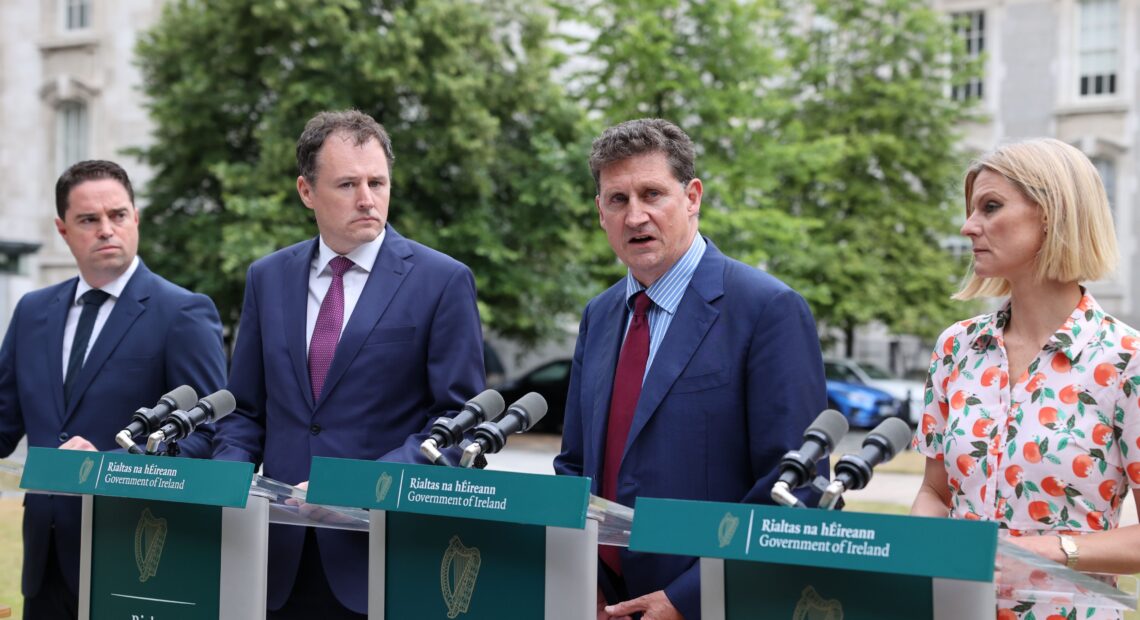The government has reached agreement on Sectoral Emissions Ceilings which will ensure Ireland plays a leading role in combatting climate change and leave the planet in a better shape for our children.
The Emissions Ceilings will give us cleaner air, warmer homes, and a better quality of life. Every sector will play its part and this plan will help to secure the future of every sector, including farming.
The Ceilings set maximum limits on greenhouse gas emissions for each sector of the Irish economy to the end of the decade.
Crucially, the changes for agriculture will be voluntary and will allow farmers to play their part. There will be generous financial incentives in return with an additional financial package in Budget 2023.
The Sectoral Emissions Ceilings have been set for the electricity, transport, buildings, industry and agriculture sectors, delivering on a key Programme for Government commitment.
This will involve a big transformation for all parts of society and all organisations, and the Government intends to bring everyone along with us.
Commenting on the today’s announcement, Minister of the Environment, Climate and Communications, Eamon Ryan TD, said, “we’ve seen this summer how temperatures across Europe have soared and tens of thousands of people have been evacuated because of wildfires. The planet is clearly heating up rapidly and we need to take action quickly. By setting these targets, across six critical sectors of our economy, Ireland is stepping up to the plate in reducing our impact on an increasingly fragile planet.”
“The targets that have been set today are going to be challenging for all sectors but they are also fair, appropriate and, importantly, based on what is achievable. We have also agreed additional resources and commitments to scale up and speed up our progress on solar, off-shore wind, anaerobic digestion for nature, and agro-forestry. I have every faith that we will, together, reduce our overall economy-wide carbon emissions, year by year. This is not just the right thing to do for our environment and our planet; this is also the smart thing to do for our economy, and to protect ourselves against the high cost of fossil fuels.”
Minister for Enterprise, Trade & Employment, Tánaiste Leo Varadkar said, “we must be the generation to turn the tide on climate change. Our planet is getting hotter by the day and extreme weather events are becoming more frequent. It’s our responsibility to leave the world in a better shape than we inherited it. The enterprise sector is committing to a 35% reduction in emissions by 2030. As Minister, I will take the lead, helping our businesses to make the changes and take advantage of the opportunities that will come. We will provide advice and expertise, grants and loans to reduce energy use, increase the use of electricity and, in time, hydrogen, carbon capture and storage and other new technologies.”
“We will also avail of the many business and employment opportunities that arise from climate action by becoming a producer and exporter of clean, secure and cheap renewable energy and fertilisers, a major retrofitting programme and a leader in new technologies like synthetic aviation fuels, autonomous vehicles, electric aircraft and robotics. I know that the reduction in agricultural emissions has been the most contentious. It’s a 25% reduction against a society-wide target of 51%. Farmers will play their part. They are up for the challenge and we will help them every step of the way. Sustainable, efficient, Irish food production is essential. In the future, the world will need more food not less.”
“Meeting the target will be challenging. The Government decision is clear. There will be no coercion or compulsion. Rather, we will ask farmers for help. We need timber to help us build urgently-needed new homes. We need more solar energy and wind energy to provide a secure supply of affordable domestically produced electricity. We need biogas for heating and to reduce our dependence on imported natural gas. Farmers can help us by embracing these new opportunities. It’s the Government’s job to make it worthwhile and attractive financially and we will not be found wanting in that regard. We have agreed a Climate Law, carbon budgets and now sectoral ceilings. Our focus now must be on implementation.”
Minister for Agriculture, Food and the Marine, Charlie McConalogue TD, said, “the Government has agreed a pathway to a 51% cut in economy wide emissions by 2030. The emissions ceiling for agriculture has been set at a level requiring a 25% reduction by 2030. This falls within the target range assigned to the sector under Climate Action Plan 2021. I am pleased to have reached this conclusion as a way of offering certainty to our farm families and their businesses over the next decade.”
“The Programme for Government and the Climate Act committed us to strong climate action. The world is facing a climate crisis, so such action is absolutely essential. It also recognises the special economic and social role of agriculture, and the importance of sustainable food production. I am satisfied that the agreement we have arrived at today strikes an appropriate balance in this regard.”
“This target reflects a very challenging but achievable ambition for the sector. The protection and enhancement of our sustainable food production system, while ensuring that agriculture plays its part in climate change mitigation, has been a priority for this Government. I am confident that farmers will embrace this challenge and, as Minister, I will stand full square behind our farmers on this journey to support them at every step.”













